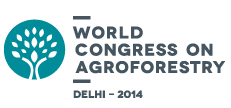ZEF experience and track bridging science and development: agroforestry examples
ZEF experience and track bridging science and development: agroforestry examples
wca2014-LA-043 Borgemeister C.1*, Callo-Concha D.1, Schwachula A.2, Denich M.1, 1Department of Ecology and Natural Resources Management (ZEFc), Center for development Research, University of Bonn. 2Department of Political and Cultural Change (ZEFa), Center for development Research, University of Bonn.At the Center for Development Research (ZEF), University of Bonn, we aim to understand and support local and international efforts to improve human well-being and ecological balance. As both actors in and critics of development, we reflect about the roles of science to tackle development. In this paper the ZEF’s understanding and how-to’s are explained.
In the first section, ZEF’s understanding of development as a multidimensional process in urban and rural settings is detailed. Our strategy encompasses research-based economic, social and ecological arguments, tools and methods to tackle specific developmental issues. Furthermore, through the integration of this knowledge by applying principles of transdisciplinarity, strategic partnership and capacity development, we attempt to transform research on development into research for development.
The second section focuses on research for development in practice through examples of long lasting research projects: wild forest coffee in Ethiopia, land and water use in Uzbekistan, and alternatives to slash and burn in the Brazilian Amazon. These examples targeted a wide range of agroforestry systems taking place in different socio-ecological settings, and looking for diverse goals.
We illustrate that if science in general and agroforestry as a specific case shall contribute to development, the background conditions to be fulfilled are: the research projects themselves have to be set up and implemented in a transdisciplinarity way, specific expertise is needed to transform research knowledge in land-use activities, and surrounding policies have to be supportive.

